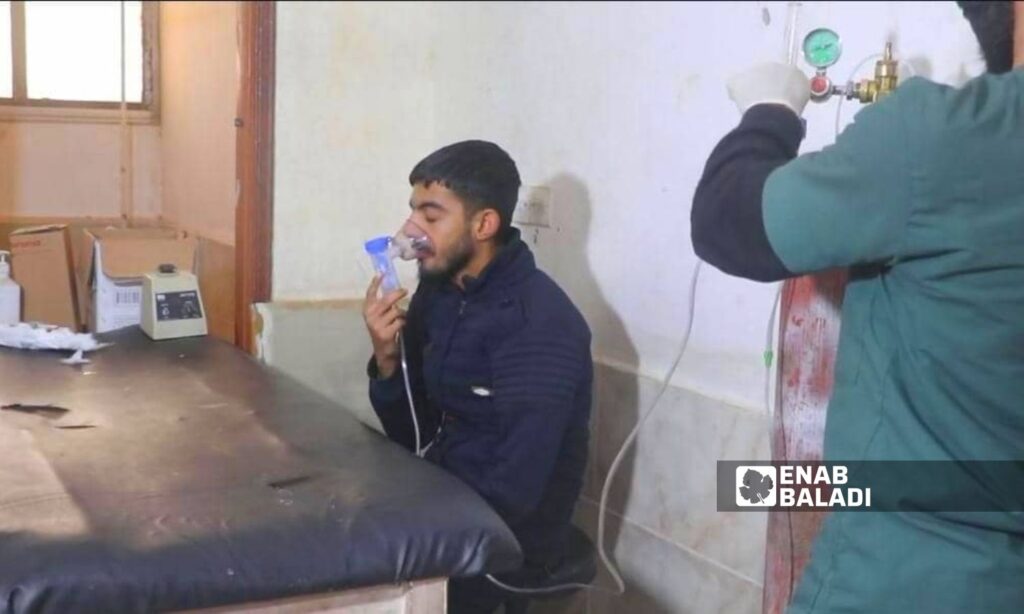In recent weeks, hepatitis symptoms have appeared in the rural areas of Deir Ezzor, where the Autonomous Administration of North and East Syria (AANES) is in control. This has caused fear among the residents of the area, amidst deteriorating medical conditions that have been ongoing for years.
Numerous cases of this disease have concentrated in eastern rural Deir Ezzor. Medical sources active in the area told Enab Baladi that the cause of these cases is contaminated drinking water.
Najwa al-Rawi caught a cold about 25 days ago, and her family thought it was a severe flu. They went to a nearby pharmacy to get cold medicine, but it didn’t help, according to what the young woman told Enab Baladi.
She added that her health deteriorated over time, prompting her family to take her to al-Shahil Specialized Hospital. Due to the lack of available medicines in the hospital itself, she was transferred again to a private hospital in Raqqa.
Her treatment journey began after undergoing tests that showed she was infected with hepatitis. Her condition worsened due to the medicines she got from the town’s pharmacy, as she continued taking fever reducers that negatively affected her, according to what doctors in Raqqa told her.
Abdul Rahman al-Sarrai also underwent numerous medical tests after feeling ill, but the test results were normal.
A few days later, his condition worsened, and he entered Jadid Bakara Hospital where new tests were requested. It turned out that he was infected with hepatitis. With the lack of solutions in the hospital he was transferred to, his family had to take him to Damascus after his health deteriorated and he did not respond to treatment in the area, he told Enab Baladi.
Al-Sarrai added that the doctors attributed his infection to the contaminated drinking water in the area where he lives in eastern Deir Ezzor.
500 infections
Enab Baladi tried to contact medical authorities in the Autonomous Administration to obtain statistics on the number of infected individuals, but did not receive a response. The Administration requires a license to practice journalism in their areas of control.
A doctor at al-Shahil Specialized Hospital in the town of al-Shahil, eastern Deir Ezzor, who requested anonymity because he is not authorized to speak to the media, told Enab Baladi that diseases resulting from contaminated drinking water and excessive exposure to sunlight have recently spread in the area.
He added that symptoms of these conditions are unpredictable and can be mild or severe, potentially leading to death if not addressed promptly. A woman previously died in the town of al-Sabha due to typhoid fever caused by water contamination.
He pointed out that hospitals need to ensure the availability of medicines, as the area suffers from disease outbreaks. He noted that the high prices of medicines have driven many residents to seek public hospitals since they cannot afford to purchase medicines on their own.
According to the doctor, the cost of treating a fever patient can exceed half a million Syrian pounds.
He added that the Euphrates River is polluted due to several factors, including the laying of oil smuggling lines across the river, sewage systems discharging into the river, the malfunctioning of water plants, and repeated water cuts that force residents to buy unclean water for drinking.
A senior source in the Health Committee of the Autonomous Administration in Deir Ezzor, who requested anonymity because he is not authorized to speak to the media, told Enab Baladi that bacterial diseases have spread widely in Deir Ezzor, with more than 500 cases since early August.
He added that the committee recorded about 35 cases of hepatitis, treated in public hospitals in Deir Ezzor, and mentioned that there are unlisted cases treated in private hospitals.
Deteriorating medical sector
The doctors told Enab Baladi that the medical and service sector needs support to combat these diseases and limit their spread.
The medical sector in rural Deir Ezzor, which is under the control of the Autonomous Administration, suffers from a shortage of equipment and medical staff. Germ-related disease cases surface occasionally.
The region lacks many medical specialties, most notably neurology and heart surgeries. Moreover, doctors often face threats, prompting them to leave in search of safer places to continue their work.
In a previous interview with Enab Baladi, Dr. Bakar al-Sayed Ahebbash, who works in the town of al-Saawa, western Deir Ezzor, stated that the total number of doctors in rural Deir Ezzor in all specialties registered with the Autonomous Administration is 250.
He explained that the area suffers not only from a shortage of staff and devices but also from a lack of medicines, along with deficiencies in equipment for some medical laboratories.











